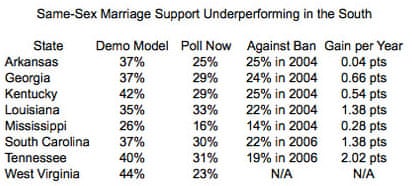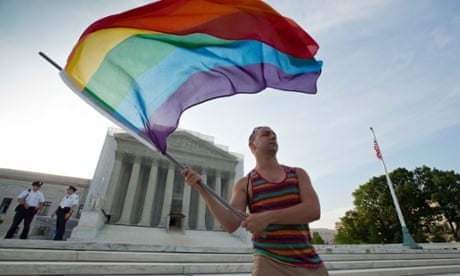America loves to talk about its democracy – except for when we don't like its outcomes. The overturning of California's Proposition 8 is a perfect example.
Five years ago, the people of California went to the polls and decided to constitutionally ban same-sex marriage via a ballot initiative known as Prop 8. This was after a California supreme court ruling that a previously voted-upon statute (Proposition 22) was unconstitutional under state law. People upset with Prop 8 then decided to sue to overturn it. The state government refused to defend it after it was overturned in federal district court. Eventually, the district court's decision that Prop 8 was not in compliance with the US constitution became the law that went into effect.
Gay marriage, arguably, should never have been voted upon in the way that it was, but it must nevertheless be acknowledged that the court's decision overturned "the will of the people". In effect, what happened was that we said "the people can vote on it, and if we don't like the outcome, then screw the result". This point was made in part by Seth Masket last week, and it is one that will define the gay marriage debate going forward.
The US supreme court has, for now, left it up to states to determine whether or not marriage should be legal. While legalising gay marriage is becoming the majority opinion across the US, state polling indicates that marriage equality is far from becoming the law in every state. Surveys conducted over the past few years in a number of southern states have found that these states were not only less likely to support gay marriage than the rest of the country, but their rate of change was slower as well.

A number of southern states, from Alabama to West Virginia, could be waiting multiple decades until a majority of residents is willing to support same-sex marriage. I'd expect most, if not all, of the south to be in favor by 2030-2040. Before this point, however, any legalization of same-sex marriage in these states is going to have to come from federal intervention. Almost certainly, that will need to come from another supreme court decision dictating that marriage equality must become the law of the land nationwide. That decision, if and when it comes, will arrive despite "the will of the people" in much of the south.
But the situation is more complicated still. All the southern states except for West Virginia have in place a constitutional ban against same-sex marriage. All the southern states – except for Arkansas and Mississippi, where support for gay marriage is somewhere between 20% and 30% – require state legislative action before overturning a state constitutional amendment against gay marriage.
The fact that state legislatures will be required to act changes the entire equation for the south. All the southern legislatures with a constitutional ban against gay marriage also feature Republican control of at least one house of the state legislature. In most cases, Republicans control both houses with plenty of room to spare and no sign that control is going to switch anytime soon. All of the states that require going to the legislature demand super-majorities (60%+) and/or at least two consecutively elected legislatures to approve an amendment for it to reach the popular ballot.
What this basically means is the same-sex marriage debate is not even about what the majority of the people thinks in most of these states. Republican legislators control the action. That's the whole game.
Throughout most of the south, Republican support for gay marriage is in the low teens. That has little changed in the past decade. Even if the rate of Republicans favoring gay marriage picked up by 1pt per year, it would still take until at least 2050 in most of the south before a pro-gay marriage position became the norm among Republican voters. That creates a huge difference between 2030 (or 2020, in the case of Virginia) as the likely date when a majority of southerners will approve of gay marriage and 2050 (or later) when a majority of Republicans in those states approve of it.
So, we're probably faced with a same-sex marriage debate that will be decided and closed without people in the south having their voices heard. These are the two scenarios: either the supreme court will rule it legal in every southern state; or Republicans in those legislatures are going to hold it up long past the point that most people in these states accept it as the law of the land.
Until the point when polling in southern states shows a majority in favor, I'm sure those against it will claim to represent the popular will to support their position. At the point the polls turn in the other direction, those against same-sex marriage will quietly drop any mention of "the will of the people". Even so, Republicans in state legislatures will be able to hold up legal change probably for years, despite being charged as "obstructionist".






